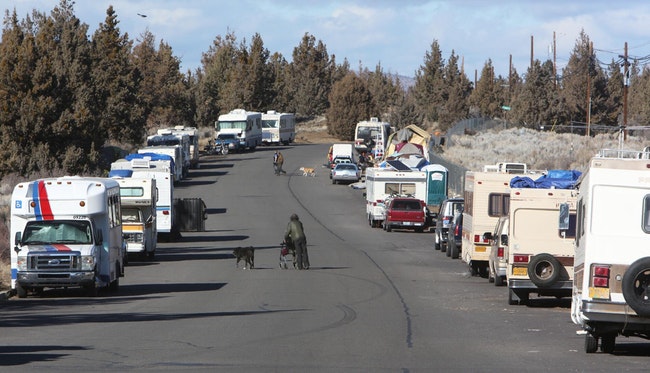
The lack of beds has prompted discussion about changing codes in order to make it easier for organizations to create shelters for homeless people. Without adequate space, they have had to find other places to go, like Hunnell Road, where more than 30 vehicles were parked Tuesday, Feb. 23. (Dean Guernsey/The Bulletin)
BEND – It could be easier to create a homeless shelter in Bend if newly proposed codes are adopted.
On Monday, the city planning commission heard two proposals that are designed to make establishing a homeless shelter easier in Bend, according to city staff.
The city wants to remove a code that requires 1,000 feet of separation between temporary housing facilities and make transitional housing, which includes warming and permanent homeless shelters, an outright use in commercial zones and in the section of the Bend Central District that is west of Third Street. The Bend Central District sits east of U.S. Highway 97 and west of Fourth Street and is centered on Third Street.
The proposed changes are in response to the city’s effort to buy a hotel and turn it into a homeless shelter as a part of a state program called Project Turnkey. Earlier this month, the city entered a purchase and sale agreement with the owner of the Old Mill & Suites Motel on Third Street.
The changes also come at a time when the city is focused on how to close the gap between a growing homeless population and an inadequate number of shelter beds. According to a presentation from the city, there are roughly 600 shelter beds in Bend year-round.
An annual count of homeless people, called the Point-in-Time count, surveyed nearly 1,000 homeless residents in Bend in January 2020. Colleen Thomas, the homeless services coordinator for Deschutes County, said in an email new figures are not out yet for 2021, but early data suggests the population has grown again.
“We see why they are camping off Hunnell Road, or off Knott Road or making their own place at Juniper Ridge because we just don’t have enough safe places, structures for them to go,” said Carolyn Eagan, the city’s economic development director, at the planning commission meeting Monday.
But in order for the Project Turnkey shelter to become a reality, the rule requiring 1,000 feet of separation needs to be removed. Currently, Old Mill & Suites Motel is less than 1,000 feet from St. Vincent de Paul, a homeless nonprofit that also offers transitional housing.
The purpose of the code when it was originally created in 2003 was to keep homeless shelters from being in the same section of town, Eagan said. But having homeless shelters closer to things like transit and services is now more of a priority.
“It was absolutely envisioned as a way to make sure we wouldn’t concentrate homeless shelters all in one spot,” Eagan said. “But as we’re learning … we have more dense development in Bend than ever before, and now we know more about how to site temporary housing.”
Allowing shelters in commercial zones and west of Third Street in the Bend Central District as an outright use is also necessary because if the city does receive the grant money to move forward with the hotel purchase, it will need to work quickly.
The state grant program requires applicants to spend the money by June 30, according to Eagan. The Old Mill & Suites Motel is in a commercial zone, which means currently, the city would have to go through a conditional use process, which can take much longer and cost more in permits.
Planning Commissioner Suzanne Johannsen and a representative of the Bend Economic Development Advisory Board questioned why the city needed to change the whole code if the changes were meant for one project.
“It seems like we are responding to a single need with maybe a sweeping change,” Johannsen said.
Eagan said changing the code will make it easier for future transitional housing projects to take hold in the core of town. The city as a rule has been phasing out conditional use permits, Eagan added, because they are subjective in nature, which can make developments become more expensive and take more time.
Other members of the planning commission shared interest in wanting to revamp other parts of the city code that dictate how and where homeless shelters are allowed, including language that restricts what homeless people can do in the outdoor area around the shelter. Other than designated “outdoor recreation areas” on the shelter property, the code states all activity “must take place within the building.”
Scott Winters, the chair of the planning commission, called specific restrictions like this “dehumanizing” and that homeless guests should get to use their home, even if temporary, the same way someone else can.
“I could sit in front of my house all day, and I’m not violating a development code,” Winters said.
Jon Skidmore, the city’s chief operating officer, said there will be a larger conversation about city code and homeless shelters, but that for now these code changes are to help ensure the success of the Project Turnkey motel.
“(The code) needs a shake up,” he said. “But that shake up is going to be a more involved community conversation.”
Contact Salem Reporter with story tips, suggestions or questions by email at [email protected].
NOTE: This story is published with the permission of the Bend Bulletin as part of a collaborative of news organizations in Oregon sharing news content. Salem Reporter is part of the arrangement.









